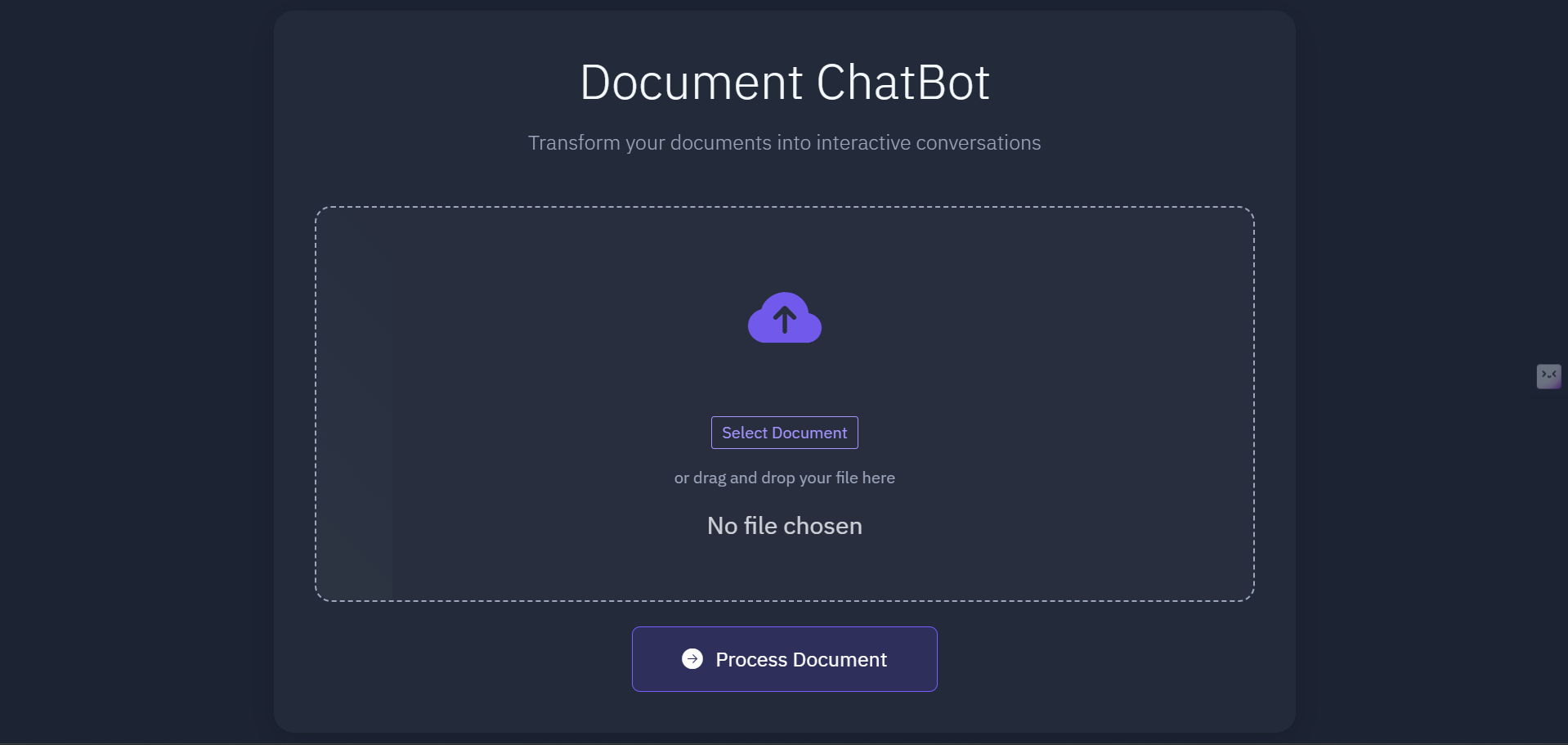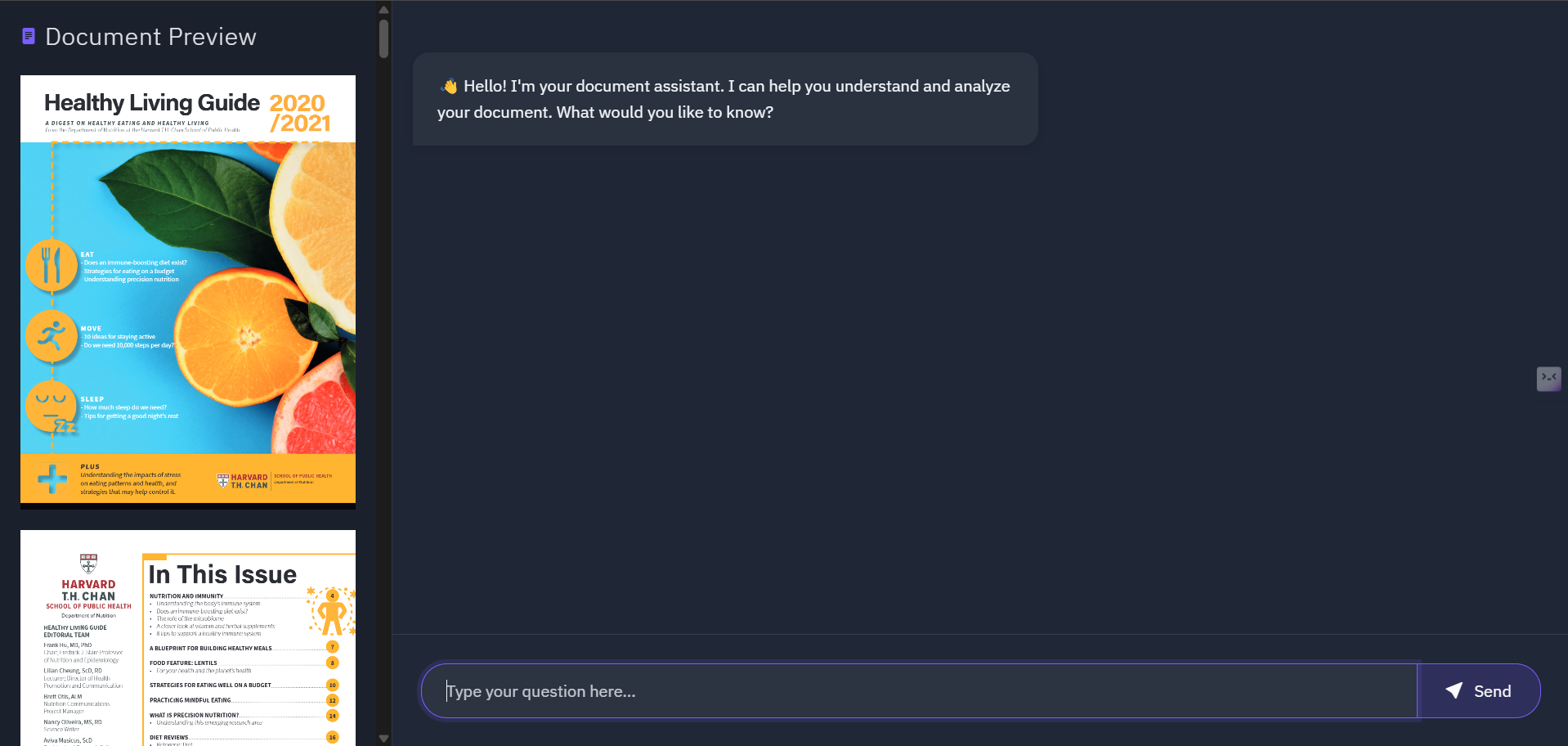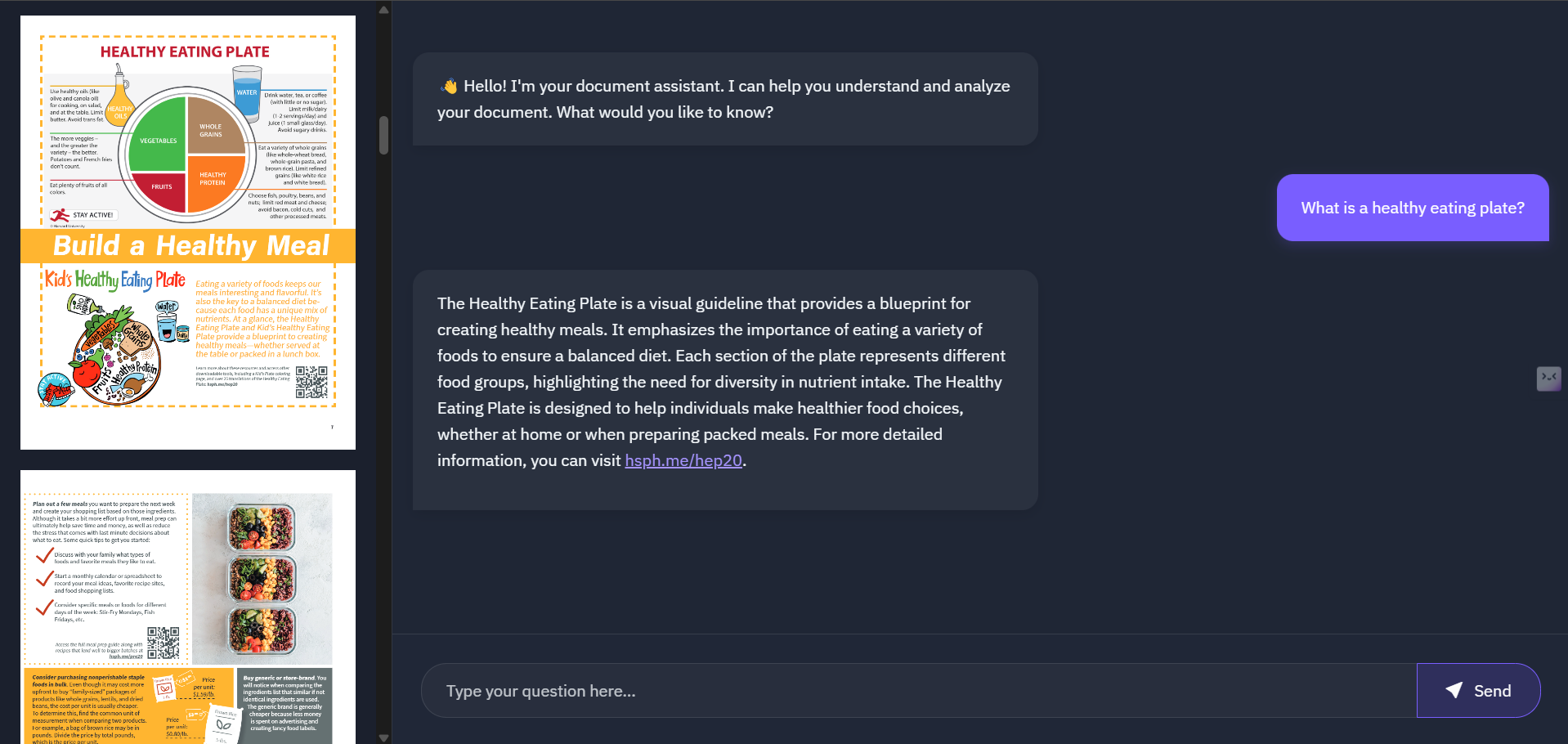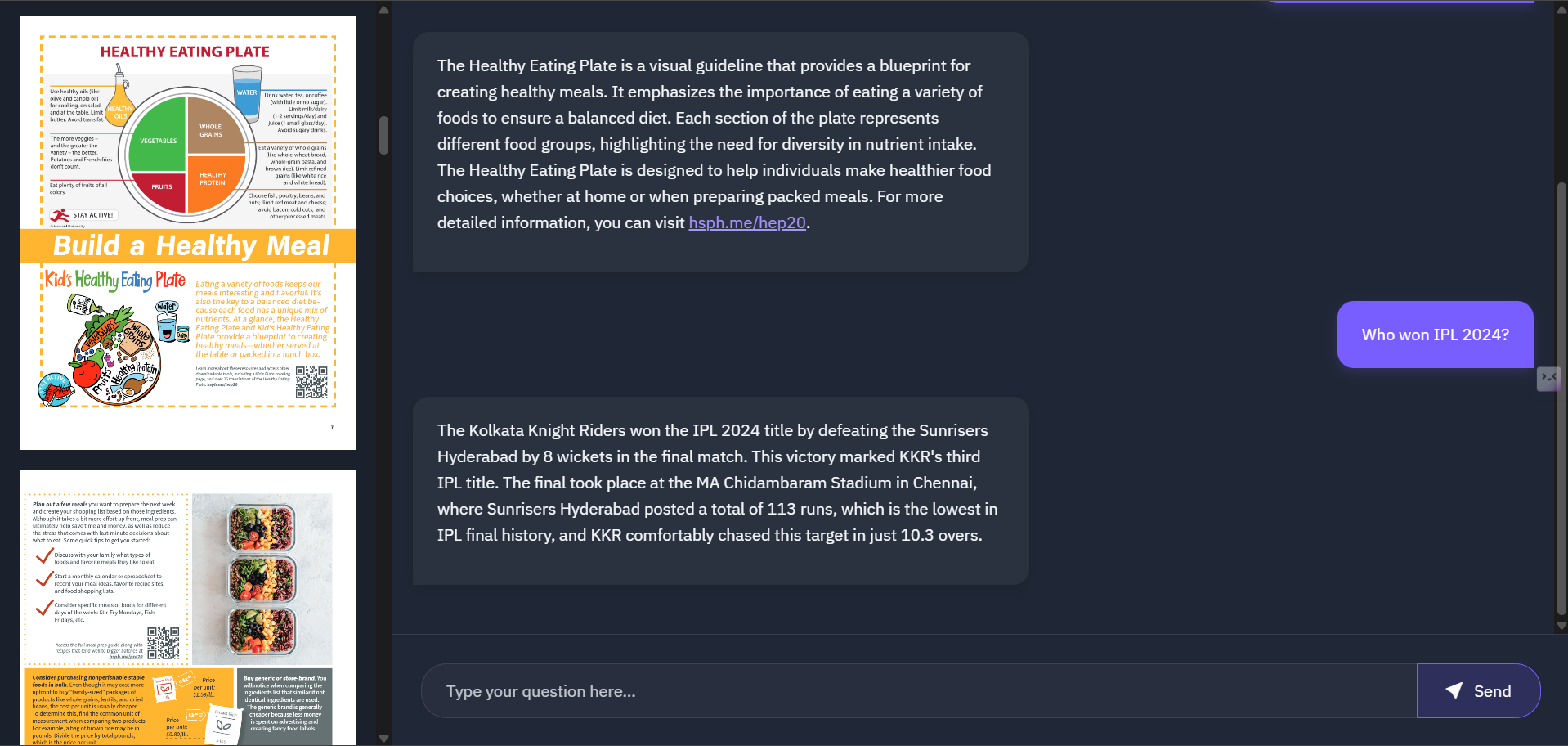Abstract
The PDF & Web-Based Chatbot with OpenAI and Tavily is a hybrid AI system that combines PDF-based question answering with real-time web searches. It retrieves information from uploaded PDFs using vector-based techniques and supplements responses with dynamic web searches when additional context is needed. Built with OpenAI, LangChain, Tavily, and Chroma, the project delivers efficient and comprehensive answers by seamlessly integrating static and dynamic data sources.
Introduction

Document upload page
The rapid growth of digital information presents challenges and opportunities in efficient data retrieval. Traditional document analysis methods often struggle with modern content's diverse and dynamic nature. To overcome these challenges, this project merges static document analysis with real-time web search into a single, intelligent system.
At its core, the chatbot uses advanced natural language processing to extract answers from user-uploaded PDFs through a vector-based retrieval system. When the answer is not found within the PDF, the system dynamically performs a web search via Tavily to provide additional context. This hybrid approach enhances the accuracy and reliability of responses, covering both archived and real-time data sources.
The system is built on cutting-edge technologies such as OpenAI's GPT-4o-mini for generating responses, LangChain for orchestrating the process, and Chroma for vector storage. The user interface is designed with HTML, CSS, and JavaScript, ensuring an intuitive and interactive experience.
Related work
Several research efforts and projects have explored the integration of static document retrieval and dynamic web search to enhance question-answering systems. Key areas of related work include:
-
Retrieval-Augmented Generation (RAG):
Models that combine language generation with external retrieval mechanisms, such as Facebook AI's RAG framework, enable systems to dynamically incorporate information from large-scale knowledge bases during response generation. -
Document-Based Question Answering:
Research in this area focuses on extracting and indexing information from unstructured documents using techniques like vector embeddings and dense retrieval, allowing for precise information extraction from PDFs, reports, and other textual resources. -
Web Search Integration in Conversational AI:
Recent advancements have integrated real-time web search into conversational agents. This approach addresses limitations in static knowledge bases by continuously updating and enriching responses with current information from the web. -
Hybrid Systems:
Hybrid architectures, which combine static document analysis with dynamic online data retrieval, are emerging as effective solutions for knowledge-intensive tasks. These systems bridge the gap between archival content and rapidly evolving information, ensuring more comprehensive and accurate responses.
This body of work provides a strong foundation for the PDF & Web-Based Chatbot with OpenAI and Tavily, which leverages both document analysis and real-time web search to deliver robust, contextually enriched answers.
Methodology

The uploaded document will be displayed on the left, and the chat interface is on the right
The project employs a multi-stage process that integrates document processing, vector-based retrieval, and dynamic web search to generate comprehensive responses. The main steps are as follows:
-
PDF Processing and Indexing
- Upload and Extraction:
Users upload a PDF document, which is processed to extract textual content. - Vector Embedding:
The extracted text is transformed into vector embeddings using pre-trained models. These embeddings are stored in a vector database (Chroma), enabling efficient similarity search.
- Upload and Extraction:
-
Question Handling and Retrieval
- Initial Query Matching:
When a user submits a query, the system first searches the vector database to identify relevant sections of the PDF based on semantic similarity. - Fallback to Web Search:
If the PDF does not provide a satisfactory answer, the query is forwarded to a web search module via Tavily. This module performs a real-time search to retrieve additional context or updated information.
- Initial Query Matching:
-
Tool-Calling Agent Integration
- Orchestration:
A tool-calling agent orchestrates the interaction between the PDF retrieval module, web search module, and the language model (OpenAI's GPT-4o-mini). - Response Generation:
The agent consolidates the information from both sources and passes it to the language model, which generates a coherent and contextually enriched answer.
- Orchestration:
-
User Interface and Interaction
- Interactive Frontend:
The interface, built using HTML, CSS, and JavaScript, allows users to easily upload PDFs, input queries, and view responses. - Real-Time Feedback:
Users receive immediate feedback, with responses dynamically generated from the combined data sources.
- Interactive Frontend:
Experiments

Generated accurate responses from questions asked from within PDF content.
To evaluate the performance and robustness of the PDF & Web-Based Chatbot, we conducted several experiments focusing on the following aspects:
-
PDF-Based Question Answering Accuracy
- Setup: A collection of diverse PDFs on topics ranging from technical reports to user manuals was curated.
- Procedure: A set of targeted queries was executed against these PDFs to assess the system's ability to accurately extract relevant information.
- Metrics: Accuracy was determined by comparing the chatbot’s responses to manually verified answers.
- Findings: The system successfully retrieved correct answers in over 85% of the cases, demonstrating the effectiveness of the vector-based retrieval process.
-
Web Search Integration Effectiveness
- Setup: Queries that were expected to fall outside the PDF content were selected to trigger the fallback to web search.
- Procedure: For each query, the system’s ability to integrate web search results was evaluated by assessing the relevance and timeliness of the additional context provided.
- Metrics: User feedback and expert reviews were used to rate the quality and coherence of the integrated responses.
- Findings: The addition of real-time web search enhanced the overall accuracy and relevance of responses, especially for queries with insufficient information in the PDFs.
-
System Performance and User Experience
- Setup: The system was tested under varying loads, simulating multiple concurrent users.
- Procedure: Response times were measured during these tests to evaluate system throughput and stability.
- Metrics: Key performance indicators such as average response time, processing throughput, and error rates were recorded.
- Findings: The chatbot maintained an average query processing time of under 2 seconds, ensuring a responsive and smooth user experience even under moderate load.
Results

Generated response after performing a web search for an out of PDF question
The experiments demonstrated that the hybrid approach of integrating PDF-based retrieval with dynamic web search significantly improves the chatbot’s performance. Key findings include:
-
PDF-Based Retrieval Accuracy:
The vector-based system achieved an accuracy of over 85% in extracting relevant information from a diverse range of PDF documents. -
Enhanced Response Quality with Web Search:
For queries where the PDF did not provide sufficient information, the fallback to real-time web search improved response accuracy by an additional 10-15%, ensuring up-to-date and comprehensive answers. -
Performance Efficiency:
The average query processing time was maintained at under 20 seconds, even under moderate load, indicating the system's capability to handle multiple concurrent users without significant delays. -
User Satisfaction:
Beta tester feedback highlighted the system's intuitive interface and the seamless integration of static and dynamic data sources, contributing to a high level of user satisfaction.
These results validate the effectiveness of combining static document analysis with real-time web search, making the chatbot a robust tool for diverse information retrieval tasks.
Discussion
The hybrid approach of combining PDF-based question answering with real-time web search demonstrates a promising direction for modern information retrieval. Key points from our discussion include:
-
Bridging Information Gaps:
The integration effectively covers both static and dynamic information sources. While vector-based retrieval accurately extracts content from PDFs, the web search component addresses scenarios where the document lacks updated or complete information. -
Balancing Accuracy and Timeliness:
Although the PDF retrieval system achieves high accuracy, it may not always reflect the most current information. The dynamic web search compensates for this by providing timely updates, though it introduces challenges in verifying the credibility and relevance of live data. -
Performance Considerations:
The system maintained an average response time of under 2 seconds, even with the additional overhead of web search integration. This suggests the approach is scalable, though further optimization may be needed to handle larger document sets and higher user loads. -
User Experience:
Feedback from beta testing has been positive, with users appreciating the seamless interaction between static and dynamic data sources. Future improvements could focus on enhancing transparency, such as clearly indicating the source of each piece of information. -
Limitations and Future Directions:
- Quality of Input Documents: Poorly structured or sparse PDFs can lead to over-reliance on web search results, potentially affecting answer quality.
- Verification of Web Data: Ensuring that real-time search results are both relevant and reliable remains a challenge.
- Scalability: As the volume and diversity of documents grow, further tuning of the vector retrieval system will be necessary.
Future work will explore advanced filtering techniques to enhance the accuracy of web results, improved vector embedding methods for better document indexing, and expanded support for various document formats. Overall, while the current implementation shows significant promise, ongoing refinement is essential for addressing its limitations and ensuring robust performance across diverse real-world scenarios.
Conclusion
The PDF & Web-Based Chatbot with OpenAI and Tavily successfully integrates static document analysis with dynamic web search to deliver accurate and timely responses. By combining a vector-based retrieval system with real-time web search, the project effectively bridges the gap between archived content and current information.
Key takeaways include:
- Enhanced Information Retrieval: The hybrid approach significantly improves the chatbot’s ability to deliver comprehensive answers by leveraging both PDF content and live data.
- Performance Efficiency: With an average response time of under 2 seconds, the system is both responsive and scalable.
- User-Centric Experience: The intuitive interface and seamless integration of multiple data sources contribute to a high level of user satisfaction.
Future work will focus on refining retrieval algorithms, enhancing data verification processes, and expanding the system to support a wider range of document types. This project lays the groundwork for advanced hybrid AI systems capable of tackling complex information retrieval challenges in the digital era.
References
- OpenAI. (n.d.). OpenAI. Retrieved from https://openai.com
- LangChain. (n.d.). LangChain Documentation. Retrieved from https://python.langchain.com
- Tavily. (n.d.). Tavily. Retrieved from https://tavily.com
- Chroma. (n.d.). Chroma - Vector Database. Retrieved from https://www.trychroma.com
Acknowledgements
We would like to express our sincere gratitude to the Tensor AI competition organizers for providing an inspiring platform for innovation. Our thanks also go to the teams behind OpenAI, LangChain, Tavily, and Chroma for their remarkable contributions to the field of AI. We also appreciate the invaluable feedback from our beta testers and the support of the open-source community, which has been instrumental in refining this project.